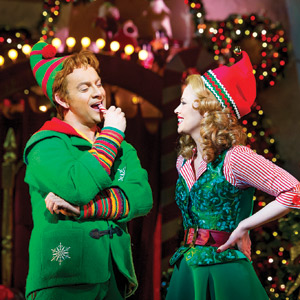Theatre scheduled for Christmas divides between shows that directly feature the season (though, these days, usually its commercial rather than theological aspects) and those that aim more broadly for a party or family audience. Two prominent examples of each are currently on offer.
Short of staging a Nativity play, the London West End could not get any closer to the core of English December ritual than A Christmas Carol (Noël Coward Theatre). This Dickens adaptation has had at least 11 pipers piping and 10 lords a-leaping in anticipation as it marks the return to theatre after a decade of Jim Broadbent, now a star in movies (Harry Potter, Moulin Rouge) and on television (London Spy, War and Peace).
Broadbent has enough stature as an actor for his stage comeback to have been a hefty Shakespeare or Pinter role, but with commendable loyalty he has chosen a script by Patrick Barlow, his old collaborator in the National Theatre of Brent.
Broadbent now transmits the vivid electricity of a screen actor seen in the flesh: his physical and vocal clowning is a constant pleasure to watch. And, while popular culture has been lavishly filled with Scrooges, his is interestingly different, not the stereotypical tight-fisted miser, but the more contemporary figure of a wealthy financier who considers himself a good man, while believing that social inequality should be addressed by self-help rather than public or private benevolence.
Disconcertingly, though, this subtle reinterpretation of a seasonal archetype is enclosed within a production that frequently veers from reflections on poverty into gags from the “poor theatre” routines of the Theatre of Brent. A door is wheeled into place by visible stagehands, through which a character – the excellent Adeel Akhtar’s Bob Cratchit or Amelia Bullmore’s Mrs Cratchit – exits and has fake snow thrown in their face.
Many of these jokes are very funny – especially the use of little fake legs hanging from their costumes to suggest characters floating through the air – but sit uncomfortably with the political spin of the script, the power of Broadbent’s performance and some genuinely beautiful effects achieved with projection and puppets, including a really tiny wooden Tiny Tim.
The theatrical scarcity value of its lead actor makes A Christmas Carol a hot ticket, but tepid in comparison with the demand for Elf: The Musical (Dominion Theatre), a trip to which even Santa Claus would struggle to fix.
The most entertaining thing that happened to me at this show was when, outside the theatre, a woman suddenly shouted: “Oh, no, where’s Vienna?” to which a passing mittel-European pedestrian crisply replied: “Between Salzburg and Graz.” Once the distraught mother had located a daughter possibly conceived in Austria, the second most enjoyable moment was noticing that the word “Dupe” had been written on my ticket, suggesting a rude reference to those prepared to go to a show where tickets are priced up to £240.
Realising that the word referred to the ticket being a duplicate for the lost original, I settled down for the third most diverting experience of the outing: the production itself.
Based on the 2003 Will Ferrell film about an adopted boy brought up as an elf by Santa and Mrs Claus, this import of a Broadway musical is promoted as suitable for children aged four-plus, although they might be advised to have taken a course in US popular culture, as references to pollution in New Jersey and the TV stars Oprah Winfrey and Dr Phil are among punchlines left unglossed in the dialogue.
The show’s moral is unobjectionable – Buddy teaches his real dad, a vulgar New York publisher, that family comes before all else – although working parents in the audience may bridle at this being another piece of American entertainment, designed to make the creators rich, that presents it as a noble thing to tell the boss where to stick the job.
It’s also striking that Elf shares with other big children’s franchises – such as Peter Pan, ET and Harry Potter – the borrowing from Christianity of the central image of a special child who is displaced and given a special mission. All those shows, in their way, are parables about the importance of faith. But, though influenced by religion, Elf: The Musical is determinedly secular.
Of the Christmas shows that go for generic jolly rather than specific holly, Wonder.land (National Theatre) is a digital twist on Lewis Carroll’s Alice stories. Lonely, bullied Aly (Lois Chimimba, an outstanding newcomer), is lured into a video game, where she becomes an idealised avatar called Alice. This conceit can be brilliantly clever – seeing Tweedle Dum/Dee, Dodo or Humpty, we are simultaneously aware of the unseen teenagers who have created these virtual identities – and the video and physical designs, including a caterpillar constructed from dancing human glitterballs, are thrilling.
But because the Carroll original essentially consists of a series of weird set pieces, the production lacks narrative momentum and runs out of story shortly after the interval.
A revival of Funny Girl (Menier Chocolate Factory), the 1964 backstage musical about singer Fanny Brice, confirms Sheridan Smith as a star in line of succession to Judi Dench and Imelda Staunton, with an equivalent dexterity between speech and song, comedy and tragedy. The Menier run is already sold out, but tickets for the West End transfer (Savoy Theatre, from April 2016) would make good Easter presents.
17 December 2015, The Tablet
Seasonal search for something more
Perennial quest to look beyond the materialism of Christmas is given voice in new shows
Edmund for England
 Loading ...
Loading ...
Get Instant Access
Subscribe to The Tablet for just £7.99
Subscribe today to take advantage of our introductory offers and enjoy 30 days' access for just £7.99





What do you think?
You can post as a subscriber user...
User Comments (0)